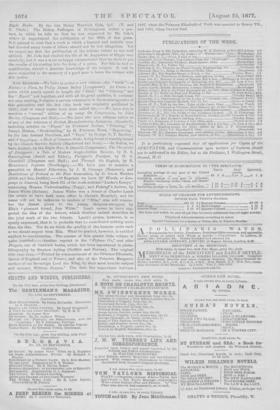POETRY. — The Meda Maiden, and other Poems. By the Earl of
Southesk, (Macmillan.) We cannot express much liking for Lord Southesk's subjects. The principal poem in the volume describes the mysterious processes by which an Indian girl attains prophetic powers, and tolls the story of her after-life. The " Chamorro " is a repulsive tale of the ghastly superstitions of lycauthropy and vampyrism. Themes removed from human sympathy are always full of the peril of failure. Even the transcendent genius of Milton did not altogether succeed. Most readers aro content to express great admiration for the "Paradise Lost," on the strength of a very scanty acquaintance with it. The chief characteristic of Lord Southesk's style is a remarkable fluency. lie is always perfectly clear ; his verso is melodious ; his rhymes, with but very few exceptions, correct, and not unfrequontly ingenious. Once or twice correction would have been advantageous. " Winter's rigid rope " is an expression that has no merit, except that of supplying a rhyme to "hope." And " human " does not go well with "woman." But these aro trifling blemishes, which we should not have noticed, but for interrupting a quite remarkable flow of easy and polished verso. The writer must also have credit for much power of expression and for a certain gift of description. Here is the "Meda Maiden's" account of one of her visions:-
`
I went to the voice: lot a pathway was gleaming,
Like sliver the track of its delicate beaming, As cold as the northerly brightness that blazes And fitfully dances in mystical mazes.
Far flashed the path, without winding or turning,
Straight to the stars in the firmament burning: Upward and upward along it I glided, Urged by the power that upheld me and guided. Wan on my lett a refulgence was lying, Diffused by the sun in that hour of his dying; Broad on my right broke a radiance incessant, Cast by the moon from the crown of her crescent. All bright, where the rays were most widely expanding, A woman majestic was movelessly standing. Sacred she seemed as the Maulto's daughter, Round was her voice as the rolling of water, Strong came her words, like the roar of a river: "I am the Woman that liveth for Ever. Thus am I named. With my name I endow thee ; Gifts for thy people, behold, I allow thee,— blight o'er diseases, for quelling and curing—.
Life to thee long among mortals enduring— Life with the deathless in splendour eternal. Go! thou art called to the glory supernal." '" What we miss is thought, and the sense that the writer has really something to toll us. —Bebe : a 7'ale. By Mark H. G. Goldie. (Henry S. King and Co.) Here, again, we have a very fluent writer, but his fluency is very unlike Lord Southesk's, for his style is ae obscure as that of the other is clear. Here are three tremendous
stanzas :—
" But God Is perfect, All, and inflate ; tile is then, with tremendous meaning, space, Perfect extension, not as mortal sight
Contracts it, measuring from place to place For easy comprehension ; nor as light
So faintly marks it on the awful face Of uucoucetvbd heaven; opening far,—
Can words tail more?—beyond the faintest star.
On earth two sexes reproduce their kind;
V° here extension,—to an attribute,
Not tied Himself,—witb thought commixral, combined,
Peoples all space; and these two constitute
The perfect God, just as in rough the mind
Extended is the mart. Here we compute By finite notions; but, aloe: we must. Think how we may, wo come at last to trust
if we go far enough. Not life this thought,
But an elastic power to produce The life that is again a power brought Ry Its extension into :nodes abstruse,
Being complex, manifold, The mind distraught
Exemplifies my meaning germs profuse, Unnumbered hold this life, it seems to me, In varied combinations, never free."
Here, it must be acknowledged, is thought, and something to be said, but how deplorable the mistake of putting it into verse As for the tale, it is "naught." Conrad Bulrhennie is shipwrecked near to the dwelling of Helm and her father. Brought book to life, he holds long conversations with the young lady, he maintaining Pantheism, as in the stomas quoted, the standing out for a personal Creator and Ruler. Then be departs, behaves in an incomprehensible fashion to another young lady to whom he is engaged—all his proceedings being accom- panied by an incessant flow of philosophical talk—tries to found a colony on high principles, fails, returns to Hobo, loaves her—for reasons quite as incomprehensible as thereat of his conduct—and disappears, not much to the reader's regret. There is real cleverness in the book, and some power of versification, but it is in a remarkable degree, even among voitimes of verse, unreadable. —St. Augustine : a Poem in
Eight Books, By the late Henry Warwick Cole, Q.C. (T. and T. Clark.) The Bishop Suffragan of Nottingham writes a pro- face, in which he tolls us that he was requested by Mr. Cole's widow to superintend the publication of the MSS. of this poem. It is natural to wish that a work to which a learned and amiable man had devoted many hours of labour should not be lost altogether. Yet we cannot say that the publication of the volume before ns was well advised. Mr. Colo had studied the life of St. Augustine of Hippo very carefully, but it was a most unhappy circumstance that ho chose to put the results of his reading into the form of a poem. For this ho bad no qualification, except a genuine knowledge of his subject. It will bo most respectful to the memory of a good man to leave the volume with this notice.































 Previous page
Previous page